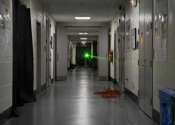Running an LED in reverse could cool future computers
In a finding that runs counter to a common assumption in physics, researchers at the University of Michigan ran a light emitting diode (LED) with electrodes reversed in order to cool another device mere nanometers away.









